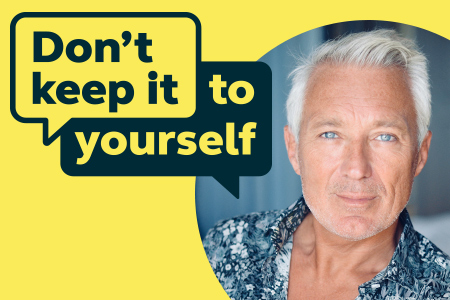Take A Breath
and support men’s health with Simplyhealth
Everyman’s Health Matters
Our Don’t Keep It To Yourself survey results are in…
As part of our campaign to explore men’s reluctance to talk about – and deal with – the tough physical and mental health issues they face, we widely circulated a gently probing survey for men aged 18 and over.
We had responses and insights from over 850 men which formed the backbone of an impassioned and illuminating webinar.
Our diverse ‘Don’t Keep It To Yourself’ panel consisted of clinical and psychological professionals sitting (virtually) alongside Martin Kemp (Spandau Ballet and EastEnders fame).
Threading throughout the lively conversation, was a raw and very personal account of the four men’s healthcare journeys; how their upbringing has affected their ability to share their inner fears about their health, and the resulting impact.
The data provided by the survey delivered a solid back-up to the areas that society needs to tackle.
Men's Health: Our Webinar

Have you ever wondered why men find it so hard to talk about their health issues? Why they struggle to exercise their emotions? And why they put-off getting advice from the professionals?
Our panel of experts included Martin Kemp (Spandau Ballet and EastEnders fame) as well as a prominent GP, an Olympic psychologist, and a leading dentist. Their passionate and personal stories addressed a wide range of men’s health issues and were expertly shepherded by our host and Clinical Director Catherine Rutland.
Five key themes emerged, and the webinar sound bites are linked below:
- Why men don’t talk: men are experts at willing their problems away
- Shaping generations: how men establish barriers based on their childhood
- When genders collide: men are learning lessons from women
- The COVID effect: a catalyst for conversations about mental health
- Paying undivided attention: having high quality conversations
Men's Health: Hints and Tips
As a man, when it comes to your mental and physical health, you have choices.
You can choose to exercise your emotions and face up to conversations about your health.
This choice is a positive force for a healthy future - not just as an act of self-care, but as a selfless move.
As you open up to those who’ve got your back, you become a healthier and happier partner, father, brother, friend, colleague and teammate.
These hints and tips aim to help male dominated communities make the right choices to boost mental and physical wellbeing by: creating positive cultures; ensuring mental health awareness; talking about the things that matter; and signposting when more help is needed.

Download our Take a Breath e-book

We’ve teamed up with the Mental Health Foundation and Harry Judd to produce a free e-book designed to help you take a breath and connect with nature.
Inside, you’ll find inspiration and ideas about how to boost your mental wellbeing using the natural world – from ecotherapy and skycology to what to do if you have no outside space. After all, being in nature is important but it’s how we open ourselves up and interact with it that really counts.
More information about mental health

Preventing problems
Stopping mental health problems before they emerge is at the heart of our approach to healthier minds.
The Mental Health Foundation identifies approaches that support people with and without mental health problems to stay well.

Practical guides
A wealth of Mental Health Foundation suggestions are found in their ‘how to’ guides: overcoming fear and anxiety, sleeping better, adjusting your diet and looking after your mental health in later life.

What's the cause?
Understanding the causes of mental health problems can help us get a grip on how to prevent them. The Mental Health Foundation looks at patterns in science and genetics and whether social, family and economic factors contribute to our mental health picture.

Food and mental health
Food doesn’t just impact us physically. There’s a complex relationship between what we eat and the health of our brain. Certain food groups can relieve mental problems whilst others will trick the brain and cause mood swings.
The Mental Health Foundation explores good and bad food and suggests simple techniques to change our eating habits to improve our mental wellbeing.

Friendships
Social contact is a crucial element in preventing mental health problems. Friendships are among the most valuable relationships we have, and over time the balance can shift with our friends to help us through tricky times.

Sharing stories
Reading about other’s mental health experiences can be valuable. Stories make you realise you’re not alone and there are nuggets of wisdom in every tale. When people open up about their challenges, the traditional silence stops and everyone benefits. Read these very human stories from The Mental Health Foundation for comfort, awareness and inspiration.

The roots of our collaboration with the Mental Health Foundation is to build healthier minds through our Take A Breath campaign.
But our work goes far beyond one campaign. We believe in being proactive when it comes to mental and physical health.
Because by building healthier lifestyles, we can avoid problems cropping up in the first place.
We all need tools that allow us to understand our minds, so we can learn how to better manage them now, and for many years to come.
Do you need urgent help?
If your mental or emotional state gets worse, or you're worried about someone you know - help is available.
You're not alone; talk to someone you trust. Sharing a problem is often the first step to recovery.
Access to 24/7 help
If you have a Simplyhealth plan - remember you have access to a 24/7 confidential helpline that offers compassionate support and structured counselling with a qualified counsellor, whatever challenges you face.
Log in to your account and visit My Wellbeing for more information.

